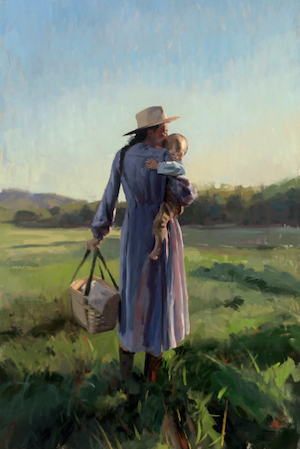Our four kids all spent the weekend with their grandparents, during which time we decided a good surprise upon their return would be new ducklings (see the video of the surprise)!
It's been well over a year since we last had ducks on our farm. Ducks were our "covid purchase," and though I certainly don't regret it, we learned that ducks start of as the absolute cutest, but quickly turn into a mess - especially when trying to raise them alongside your egg laying chickens.
During the "three weeks to flatten the curve" era, I was pregnant with Joseph and was entertained by putting on my bathing suit and swimming with ducks in our one bath tub. Was cute and all the first time when they were days old, but when I did it again when they were nearly full grown (and we were still locked down well after three weeks) it wasn't so cute and I learned for the first time that the webbed little finger nails are a bit sharp and my bulge of a belly was scraped liked I'd bathed with a cat. That of course is not even mentioning the green poop water!
But, anyways... that is not why we decided we were done with ducks. When they started laying we were ecstatic and loved frying their eggs (read all the benefits of duck vs. chick eggs here). Then just a couple of months into laying, their eggs started tasting like pond water, which, by the way, we don't have a pond. We still continued to gather their eggs, but only for baking. I should add however that duck eggs for baking are the absolute best. With all the added protein and minerals + how clean and full the whites are, they really make for the best cakes!
Besides the pondy eggs, duck copulation is not for the faint of heart. If you, like I did, assumed that it's the same as chickens... it's very much not. Multiply the appendages and the violence... It's quite a lot to behold, and quite another thing to explain to your toddler.
Our first go at raising ducks we cooped them with our chickens. That will not be the case this time. They make everything wet. Our expensive no-corn-no-soy-non-gmo food molds and gets wasted. Oh, and ducks smell like wet pillows.
Keeping them alive? We lost two of our ducks after they went broody. They sat on those eggs and it seemed so weighty with potential until both times the momma duck died shortly after the eggs all disappeared one by one. Never quite figured that out. Lost all other ducks to predators. Weasels, bobcats, red tail hawks and such. Two of our drakes discovered the creek and I think just took their leave of us. Not sure I could blame them. I hope they are doing well. David held our sweet Abilene (named after the character in The Help) as she died post hawk attack. Once she died we were left with only drakes and they became soup as we promised to be done raising ducks.
But, here we are. Duck owners. Albeit, I have no idea what breed these four are and thus what purpose these ducks shall serve. But we will enjoy them, be gentle with them, protect them as best we can, and and continue to grow as stewards.
They will smell. I will get frustrated. But I will give thanks, revel in my children's adoration of them, and marvel at the Lord's creation.







